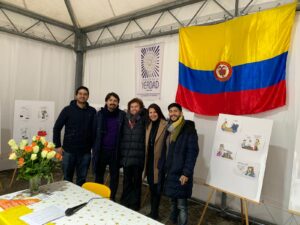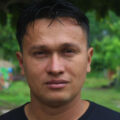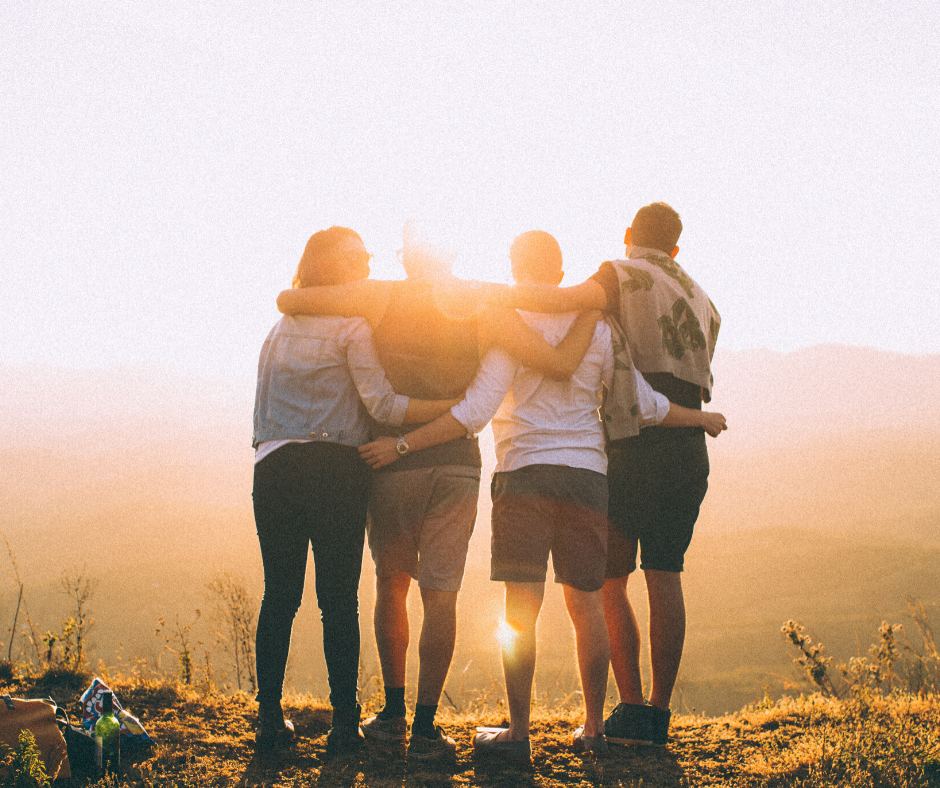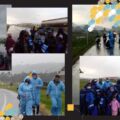
Workshop
Jorge and the work of the Comisión de la Verdad
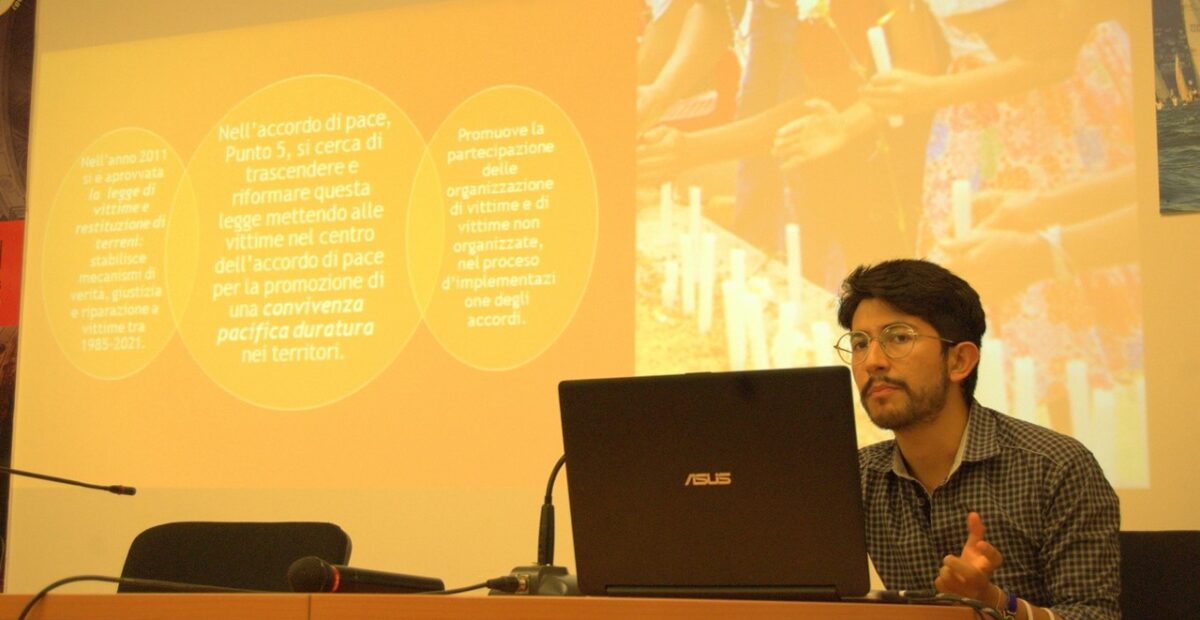
In conversation Jorge Jiménez Castro, from Colombia who is a volunteer at “Nodo Italia” which supports the work of the Comisión de la Verdad (Colombian Truth Commission).
I first met Jorge in September 2019 in Paris, while he was attending the “Ambassadors for a United World” youth formation program organized by New Humanity NGO. Jorge Jiménez Castro is Colombian, 28 years of age. Since 2018 he’s lived in Italy, near Florence as he follows the Master’s Program in Political Sciences at the Sophia University Institute at Loppiano, as well as studying Philosophy and Ethics of Relationships at the Università per gli Studi of Perugia. Back in Colombia he collaborated with MPPU (Politics for Unity Movement) in Bogotà promoting workshops in peace education. Jorge is also a volunteer with “Nodo Italia” in support of the Comisión de la Verdad, an extra-judicial organ created by the Colombian state to draw up a report on the country’s recent armed conflict, to facilitate acknowledgement of the victims and to move towards building an enduring climate of respect, concord and reconciliation in the country. Headed by the Jesuit priest Fr Francisco De Roux SJ, the Commission (for the Clarification of Truth, Coexistence, and Non-Repetition) began its work in November 2017 and is due to complete its mandate later this year, 2021. By speaking with Jorge, we hope to learn the state of this work and the prospects which are opening up as the process draws to a close. Due to the pandemic, even though my city is close to where he’s based, we conduct our conversation via video call.
Jorge, please clarify for us what the Comisión de la Verdad is and what is its goal?
«The Commission is an institution created after the signing of the peace accords on 24 November 2016 at Havana (Cuba) between the Colombian government and FARC (Fuerzas Armadas Revolucionaria de Colombia). The system created by this peace accord (integrated system of truth, justice, reparation and non-repetition) included the creation of an organ assigned to draw up a report on the truth of the conflict, to investigate the causes, and to collect the witness statements of the victims. So this Commission had to launch a process of collective dialogue involving all the voices, all the testimonies and facts of the conflict. Twenty-two “houses for the truth” were established in different regions of Colombia. Our country has a very rugged geography, with the Andes mountain range causing many communities to be isolated. The war itself caused the social, economic and political differences to polarize different cultural identities (be they Afro-Colombian, Indigenous peoples, or women, farmers, city residents) in different territories, with very differing stories, responsibilities and sufferings caused by the conflict. At one point we realised that among these victims – even if the actual term ‘victim’ is disputed because many people affected by the conflict identify not so much as victims but rather as ‘political figures’ or ‘survivors’ – but anyway, we were not taking into consideration those who no longer lived in Colombia, who’d fled for political reasons or to escape violence. So, a network was formed of “nodi” – informal groups in different countries, composed of volunteers who tried to get organized to promote the task of the Commission in seeking out the truth, collecting witness statements of victims or survivors of the war in Colombia».
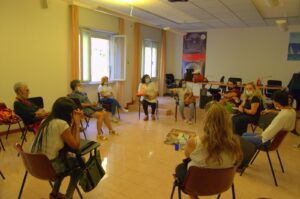
Jorge, you’re part of one of these “nodi”… which one?
«I’m part of the ‘nodo’ for Italy. There are other ‘nodi’ throughout America: South, Central and North, and also in Europe. There’s like a macro section of the Commission which coordinates the 25 ‘nodi’ outside the country. Sometimes we have meetings with people based in Costa Rica, Panama, Ecuador where there are many exiles, or in Spain which has the highest number of Colombian exiles in Europe… ».
In the Italian ‘nodo’, have you been able to identify stories of Colombian exiles?
«This has proved to be quite a complex task because not many victims have been identified in Italy yet. Just around 250. A small number when compared with the 5,000 to be found in Spain. And over time we’ve come to realise that many people have hidden the fact they were victims of the Colombian conflict. They hide that part of themselves, of their story, hoping in that way to be better able to face emigration, exile and builing a new identity in this country. So, for our work, we turned to the associations formed by the Colombians themselves wherever they settled. I coordinated the area around Florence and Tuscany. In Florence, for example, there are two associations for Colombians and we tried to reach out to people through these. It was a difficult task because many didn’t want to speak to us or reveal themselves as ‘victims’ or be identified as such. We discovered the same phenomenon in Rome, Modena and Trieste. So this meant we had to find a more ‘educational’ approach in order to enter into the community. We realised those who had already taken part in political processes developed a kind of self-awareness which enabled them to say, ‘Yes, I am a victim, this is what happened’. But, for example, a woman who used to farm in rural Colombia and fled because her sons had been murdered, and who found work in Italy as a cleaner – she did not have this capacity and no-one here had any idea what she’d gone through in her home country. Because she did not share her pain over the death of her sons with anyone, she had not psychological processed the trauma. So, we found ourselves accompanying these people who trusted us and entrusted their stories to us. It’s a kind of ‘psycho-social’ accompanying, you could say. And in the process, we’ve had to develop conversation strategies.
We turned to the Churches for help, to parishes, to Caritas, to associations, to all possible ‘safe spaces’ who could help our people say: ‘Yes. This is what happened to me. This is what I lived through’».
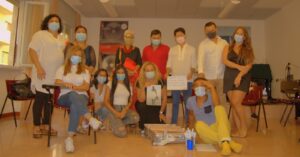
In the process, you had an original idea…
«We got to know of an Afro-Colombian community in Trieste, whose members originated from the West of Colombia, a region with some strong popular artistic traditions in which drum music and dancing play an important part. We wondered if something wonderful could happen in a project focussing on them, starting with art as a way to speak of their story and their sufferings. From this event, a new strategy was born, the MemorArte Fest, the first ever digital festival in memory and honour of the victims of the Colombian armed conflict and of all armed conflicts. We also involved people from other war-afflicted countries. We invited directors, writers, poets, artists, even some famous ones, who participated in solidarity, expressing their commitment to build peace. We invited the Colombian artists, who live in some Italian cities, to create a work in homage to the victims. We realised this collaboration generated a climate of trust which enabled many of them to share their own stories with us. So we were able to gather more testimonies, fruit of this collaborative artistic space».
The mandate of the Comisión dela Verdad ends in 2021. What will this mean? Can you tell us what will happen next?
«It all started from a process launched by victims’ organizations in Colombia, for their rights to be recognized within the country. In fact, it led to a new law in 2011 widely related to the victims of conflict. This law created a series of mechanisms to identify victims in all regions. This law expires in 2021 too. The actual system of special justice for peace – a system comprising a tribunal specifically to judge the guerillas and all those involved in the war, and including the Commission for Truth – has a specific deadline, which is until circa 2037.
Over three years the Commission had the task of collecting all the testimonies which can be used to create a map, we could say, of the causes of the conflict, gathering all the different voices, both of the victims but also of the perpetrators, or another kind of victim, because we’re starting to acknowledge that in war everyone is a victim in a certain sense.
So the Commission has to conclude the process by 2021, producing a dossier to inform Colombian society what the victims have experienced, what happened, why a historical memory of this process to promote social dialogue and reconciliation must endure. In order to give sustainability to the legacy of this work, the commission will widely disseminate artistic, audiovisual and journalistic material to make society acquainted with the listening processes that led to the clarification of the truth of the history of the conflict, working alongside social organizations, communities, the media, the international community, universities and the business sector to promote a lasting process of reconciliation and peaceful coexistence. This is the perspective of restorative justice which has been at the very heart of this process for peace».
